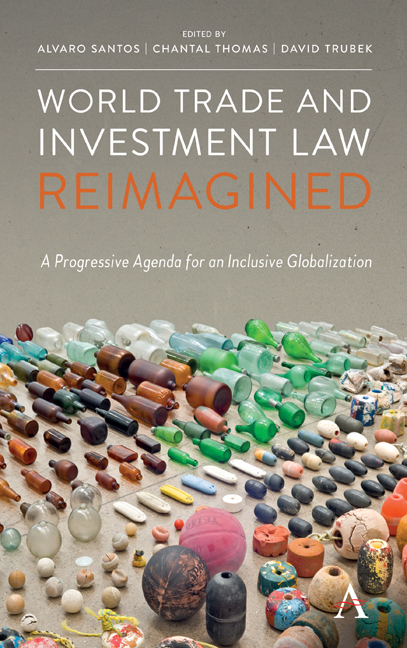Book contents
- Frontmatter
- Contents
- Acknowledgments
- List of Contributors
- Introduction World Trade and Investment Law in a Time of Crisis: Distribution, Development and Social Protection
- PART I RETHINKING THE POLITICAL ECONOMY OF TRADE: COMMENTS ON DANI RODRIK'S STRAIGHT TALK ON TRADE
- PART II SETTING THE STAGE FOR A PROGRESSIVE VISION: EMERGING ISSUES IN WORLD TRADE AND INVESTMENT LAW
- SECTION 1 MAPPING THE NEW CONTEXT FOR TRADE AND INVESTMENT LAW
- Chapter Six The End of Trade and Investment Law as We Know It: From Singularity to Pluralism
- Chapter Seven Heterodox Market Orders in the Global Trade System
- Chapter Eight Embedded Neoliberalism and Its Discontents: The Uncertain Future of Trade and Investment Law
- Chapter Nine Rethinking the RCEP in the Third Regionalism: Paradigm Shifts in World Trade Law?
- Chapter Ten Beyond Normal Trade Law?
- SECTION 2 DEALING WITH MAJOR CHANGES IN THE WORLD ECONOMY
- SECTION 3 FRAMING A MORE EQUITABLE INVESTMENT LAW REGIME
- SECTION 4 SUPPORTING DEVELOPMENT
- SECTION 5 REINFORCING SOCIAL PROTECTION: SPREADING THE BENEFITS OF TRADE, DEALING WITH LOSSES AND EXPLORING THE TRADE–IMMIGRATION NEXUS
- Index
Chapter Eight - Embedded Neoliberalism and Its Discontents: The Uncertain Future of Trade and Investment Law
from SECTION 1 - MAPPING THE NEW CONTEXT FOR TRADE AND INVESTMENT LAW
Published online by Cambridge University Press: 07 September 2019
- Frontmatter
- Contents
- Acknowledgments
- List of Contributors
- Introduction World Trade and Investment Law in a Time of Crisis: Distribution, Development and Social Protection
- PART I RETHINKING THE POLITICAL ECONOMY OF TRADE: COMMENTS ON DANI RODRIK'S STRAIGHT TALK ON TRADE
- PART II SETTING THE STAGE FOR A PROGRESSIVE VISION: EMERGING ISSUES IN WORLD TRADE AND INVESTMENT LAW
- SECTION 1 MAPPING THE NEW CONTEXT FOR TRADE AND INVESTMENT LAW
- Chapter Six The End of Trade and Investment Law as We Know It: From Singularity to Pluralism
- Chapter Seven Heterodox Market Orders in the Global Trade System
- Chapter Eight Embedded Neoliberalism and Its Discontents: The Uncertain Future of Trade and Investment Law
- Chapter Nine Rethinking the RCEP in the Third Regionalism: Paradigm Shifts in World Trade Law?
- Chapter Ten Beyond Normal Trade Law?
- SECTION 2 DEALING WITH MAJOR CHANGES IN THE WORLD ECONOMY
- SECTION 3 FRAMING A MORE EQUITABLE INVESTMENT LAW REGIME
- SECTION 4 SUPPORTING DEVELOPMENT
- SECTION 5 REINFORCING SOCIAL PROTECTION: SPREADING THE BENEFITS OF TRADE, DEALING WITH LOSSES AND EXPLORING THE TRADE–IMMIGRATION NEXUS
- Index
Summary
An era marked by an uneasy truce between developed countries and the developing world is coming to an end. This era, which reached its apogee in the 1990s, could be characterized as “embedded” neoliberalism, where developing countries signed on to an international economic law (IEL) system premised on neoliberal tenets but softened by de jure and de facto exceptions and derogations ostensibly to accommodate developmental needs and policies. Initially, developing countries resisted rules that imposed unwanted restrictions and that limited growth options. But it was the best they could secure at the time, so they accepted much of the regime thus creating a temporary truce. With this truce between market-oriented globalization and state-based developmentalism unraveling, we look at how things might evolve and ask if there is another set of relations that would address changing conditions, manage conflicting interests and restore some stability.
The world economy is rife with clashes of values and interests. States in the North, encouraged by multinational corporations (MNCs), push to further open global markets, reduce the role of the state in the economy and provide special protection for foreign investors. States in the South resist some of these pressures in the name of development, maintain a commitment to state-led growth and demand more control over their domestic markets and opportunities abroad for their exporters. These tensions translate into stalemates over the scope of existing rules, struggles to create new ones and even the possibility that the multilateral rule-based system itself will collapse.
Over all this looms China. In recent years, China has become more assertive on the world stage, doubled down on its commitment to state-led growth and announced policies that conflict with existing and proposed rules. As its economy grows in both absolute terms and relative to that of the United States and the European Union (EU) and it strengthens relations with other developing countries, China's capacity to influence trade and investment policy may grow apace. Could we be witnessing the end of the postwar liberal order and the emergence of a China-led order more supportive of Global South values?
- Type
- Chapter
- Information
- World Trade and Investment Law ReimaginedA Progressive Agenda for an Inclusive Globalization, pp. 87 - 96Publisher: Anthem PressPrint publication year: 2019



